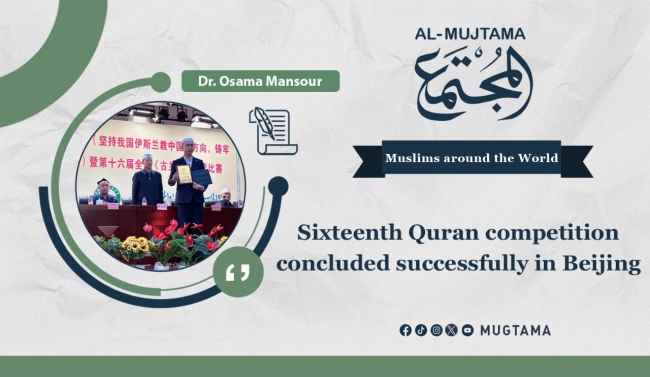Sixteenth Quran competition concluded successfully in Beijing
Last week, the Sixteenth National Competition for Public Speaking and Quran Recitation concluded in the Chinese capital, Beijing, under the auspices of the Chinese Islamic Association. The event lasted for five days.
A total of 94 contestants participated in the competition from Islamic associations across provinces, municipalities, and autonomous regions throughout the country. Among them, there were 58 speakers competing in the public speaking category, while 36 readers competed in the Quran recitation category.
The ceremony was attended by Yang Fa Ming, President of the Islamic Association, Adil Ajiqilim, Vice President of the Islamic Association from the Uyghur ethnic group, Mu Kefa, Vice President, Secretary General Zhong Bing, and Vice Presidents Yang Guanjun, Jin Jianhua, and Kong Yinlin, Vice President of the Chinese Islamic Institute, along with comrades from the relevant departments of the United Front Work Department of the Central Committee.
After strong competition, contestant Ma Jiateng from the Xinjiang region won the first prize in public speaking. Contestants Ma Chongxiao from Qinghai Province, Ma Yanbin from Ningxia Region, and Ma Jingkun from Shaanxi Province won the second prize.
Meanwhile, contestant Ma Wen from Shandong Province, contestant Ma Jinlong from Shaanxi Province, contestant Mai Yanan from Hubei Province, and contestant Zhang Liang from the Chinese Islamic Institute won the third prize.
In the recitation competition, the first prize was awarded to Ma Xiugui from Qinghai Province, and Ma Dongtao from Ningxia Region, Ma Xiaodong from Qinghai Province, as well as Baiyuan from Yunnan Province won the second prize. Ma Haiming from Zhejiang Province, Gao Qingping from Hainan Province, Gu Xiaojun from Ningxia, Ma Zanhua from Gansu Province, and Hua He from Shaanxi won the third prize.
In his speech, President Yang Fa Ming stated that this competition affirms the principle of national unity and religious freedom. The opportunity to hold such competitions at an official level is clear evidence of this. It is a high-level event that brings together various groups of the Chinese nation side by side, enhances the values of justice and equality among them, and highlights the positive image of Islam within the Chinese community and among the Chinese ethnic groups.
Ming emphasized the necessity of focusing on the study of Islamic sciences and delving deeply into them, and preparing a generation of young people armed with religious knowledge, who can convey a clear and balanced image of Islam within China. He also stressed the importance of studying the Holy Quran, memorizing it, understanding its meanings and interpretations, applying its provisions, and adhering to it in daily transactions with one another and with non-Muslims of the Chinese people. This is the only guarantee for the continued existence of Islam as an authentic religion in China and a guarantee for unity and cooperation among Chinese Muslims and their brothers from the Chinese populace, in order to build a strong, unified, and harmonious society where everyone enjoys their religious and worldly rights.
He also expressed his hope that next year's competition would include a larger number of participants than this year and cover all regions and provinces of China. He called for the participation of all ten Muslim ethnic groups in the upcoming competitions.
It is worth noting that in recent years and this year, the competition has included representatives from only two of the ten Muslim ethnic groups in China: the Hui ethnic group, the largest Muslim group, and the Uighurs, the second largest Muslim group by number, while the other eight ethnic groups remained distant from participation. These groups include Salar, Dongxiang, Bao'an, Uzbeks, Tajiks, Kazaks, Kyrgyz, and Tatars.
Although these ethnic groups all reside in the northwest and number fewer than their predecessors, they still need more support and attention to religious education, which is a hope we wish to achieve in the near future.


